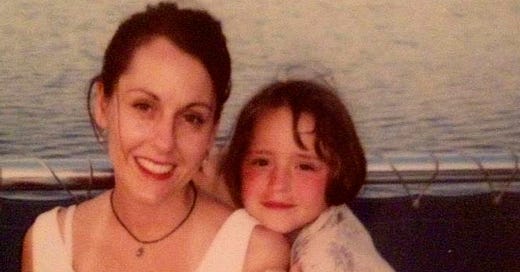🧵Thursday Thread: How do you feel about your relationship with your mother?
Mother's Day is on the horizon again, and it's a complicated day for many of us. My mother doesn't speak to me, but I am also a mother and a nana. So many thoughts ... let's share.
In her viral essay and the acclaimed anthology that emerged from it, both titled, What My Mother & I Don’t Talk About, writer Michele Filgate said:
Our mothers are our first homes, and that’s why we’re always trying to return to them. To know what it was like to have one place where we belonged. Where we fit.
And yet, for some of us, our mothers were—for one reason or another—not fully (or at all) available to us in the ways we needed once we left the womb. My own mom has cut me off for writing about my childhood, which I wrote about last year in an essay called “The Cost.” It was nominated for Best American Essays, and even though that’s the kind of long shot I don’t set my sights on, the nomination felt amazing.
And now, as a former foster child now supporting my own child—my youngest adult child and collaborator here at Writing in the Dark,
—in adopting a little boy from foster care, and also watching them help this little boy maintain a connection with his birth mother, I have many feelings about the journey we make from birth to death and the mothers and mother figures we love and lose along the way.Given my biography, I could never hope to untangle the bramble of my thoughts about motherhood—my mother, myself, or my child in the role of mother—here, but I will share that I bristle when people credit me for my children’s accomplishments, like, “good job, Mom!” After all, no one told me outright, “bad job, Mom!” when my son went to treatment for substance use disorder in his early days of college. But I felt our culture’s silent judgment all the same, and I didn’t need it. I sure did not need it.
My son is thriving now, by the way, but also—do we ever know fully what challenges lie ahead for ourselves and the people we love? If we did, would Wendell Berry have written, in his poem, “The Peace of Wild Things,” about waking “in the night at the least sound / in fear of what my life and my children’s lives may be” and given so many of us that ping of deep recognition?
Mothers are influential, obviously, we know this. But the degree to which we simultaneously exalt and blame mothers in U.S. culture is destructive, and I wish we’d stop doing that and start acknowledging that families are complicated while meanwhile providing far better systemic support (childcare and parental leave, for one!) and clear, effective education around relationships and parenting, including healthy communication skills, conflict resolution skills, and
In this vein, two years ago, I participated in an AWP panel in Seattle about writing real mothers. The event description and statement of purpose was something like this:
Neither The Madonna nor Mommy Dearest:
Why and How to Write Real Mothers
Writing well about mothers means balancing the drive for truth with the influence of misogyny. Mothers are uniquely attacked in psychology and pop culture, but also falsely venerated, a binary that papers over complexity. These writers share how they’ve resisted demonizing imperfect mothers, depicting them instead with context and curiosity. They offer techniques for writing truthfully and vividly about the mother wound without leaning on the escalating "mother blame" in American society. Centuries-old tropes about “bad” mothers seek to judge, blame, and attack women who don’t conform to societal expectations. This panel addresses the misogynistic cultural paradigms for motherhood and explores how memoirists can avoid that trap while writing truthfully about complex and painful experiences. Writers on this panel will share their approach for writing about the complicated maternal relationships without contributing directly to centuries of misogyny.
So, anyway, mothers … let’s discuss—and you can take any angle you want: your own mother, yourself as a mother (past, present, or future), or the writing of mothers—real ones, I hope.
I’m really looking forward to this conversation. I feel like it will help me be better prepared for the inevitable feelings of confusion and grief that come around every May.
Love,
Jeannine
PS The photo is me &
in 2004 in the back bay of Estero Island, Florida, where sleeping birds are safe, something I wrote about in this essay, Sleeping Birds.PPS Threads/comments are for paid members; you can upgrade/manage your membership here anytime.






